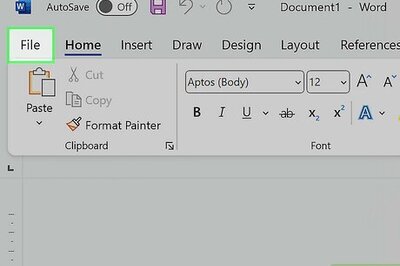
views
An accused cannot be compelled by an investigation agency to share the password of the electronic devices as he is protected under Article 20(3) (no person accused of any offence shall be compelled to be a witness against himself) of the Constitution of India and Section 161(2) (examination of witnesses by police) of the Criminal Procedure Code (CrPC), Delhi’s Rouse Avenue Court held recently.
Special Judge Naresh Kumar Laka noted, “Not only does an accused person has the right to refuse to answer any question that may lead to incrimination, there is also a rule against adverse inferences being drawn from the fact of his/her silence.”
The order was passed in an application filed by the Central Bureau of Investigation (CBI) seeking the password/user ID of the computer system and Tally Software of the accused.
During the investigation, a computer system was seized by CBI from the custody of the accused and when it was sent to CFSL agencies, the data of the said computer system could not be obtained for want of a password and user ID.
The public prosecutor appearing for the CBI argued that such direction can be given to the accused, as he was released on bail on the condition that he will co-operate in the investigation as and when required and there is no violation of any right of the accused as the information has been sought for a fair investigation.
THE OBJECTIONS
The counsel appearing for the accused raised the following objections:
- The present application has been filed without indicating any specific provision of law and this court has no inherent power to give any such direction and there is no specific provision under law which enables IO or this court to pass a direction.
- Section 91 of CrPC cannot be invoked by the IO or this court as it does not apply to an ‘accused’ in view of various judgments of the Superior Courts.
- The accused has a right to maintain silence as per Article 20(3) of the Constitution of India as well as Section 161(2) CrPC and, therefore, the accused cannot be compelled to give his password which till tantamount giving of self-incriminating testimony.
- The judgment passed in Virendra Khanna vs State of Karnataka by the High Court of Karnataka as relied by prosecution is not binding on this court on account of territorial limitation and even otherwise it is a judgment per incuriam.
- The said computer system may contain private data of accused and if it is revealed to the investigating agency, it may interfere into the right of privacy of the accused.
- If the accused refuses to provide such information, no adverse inference can be drawn against him.
WHAT THE BENCH SAID
Over the issue of the application being filed without indicating any specific provision the bench opined that no doubt, the CBI did not mention any specific provision of CrPC in the present application seeking password from the accused, but it is a settled proposition of law that in the absence of citing any specific provision of law or even when quoting wrong provision of law, such application should not be rejected straightaway and rather such application should be treated under specific provision of law which applies keeping in mind the substance/content and the prayer as made in the said application.
Additionally, the bench said, “No doubt, a password does not itself constitute a self-incriminating testimony against an accused who gives such password, but from practical point of view, the said password alone is not the sole objective of the IO and in fact he wants to use it for the purpose of accessing the data which is contained in a computer system or a mobile phone which is/are seized from the accused and, therefore, the said password is to be taken as integral part of the said computer system/mobile phone which is/are not severable from it.”
The court also noted that such data may or may not contain incriminating evidence but if there is an apprehension that it may probably contain incriminating information, the accused is within his right to maintain silence.
The IO has no right to be provided with the password of the accused without the consent of the Deaccused as it may violate Article 20(3) of the Constitution of India as well as Section 161(2) of CrPC. But the power of the IO to get open/decrypt/access the data of the said computer system with the help of specialized agency or person has not been denied, the bench added.
Given the above, the court also said it is the responsibility of the IO not to disclose a private information of an accused to any third person or to make it public without the consent of concerned accused or the lawful owner of such information.
Read all the Latest India News here




















Comments
0 comment